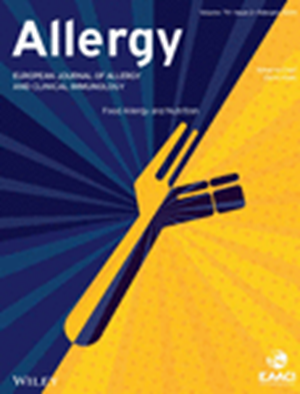初乳作为预防花生过敏的保护因素:来自出生队列的证据。
IF 12
1区 医学
Q1 ALLERGY
引用次数: 0
摘要
食物过敏影响家庭的生活质量,可能是终身和危及生命的,迫切需要识别早期可改变的风险因素。在生命的最初几天,配方奶喂养可能会增加牛奶过敏的风险,这种风险通常归因于牛奶过敏原的暴露。早期配方奶喂养也会减少初乳的摄入量,前3天的牛奶富含对免疫和肠道健康至关重要的生物活性化合物。这项研究调查了部分初乳喂养是否会增加牛奶以外食物过敏的风险。方法来自澳大利亚ORIGINS队列的666对母婴的数据将前3天内的新生儿分为纯初乳喂养(ECF,仅母乳)或部分初乳喂养(PCF,配方奶加母乳)。通过皮肤点刺试验和母亲报告的对过敏原的直接反应来确定12-18个月时ige介导的食物过敏(鸡蛋、花生、牛奶、腰果)。结果spcf患病率为46%。与ECF婴儿相比,PCF婴儿花生过敏的风险[aOR (95% CI) 4.47(1.04-19.12)]和多种食物过敏的风险[aOR 11.44(1.48-88.55)]增加。在较晚(bb70 M)引入花生的PCF婴儿中,风险更大[aOR 5.45(1.18-25.11)],而ECF婴儿无论何时都保持低风险。为了弄清从配方奶喂养中减少初乳摄入量对PCF婴儿的影响,我们分析了初乳喂养数量与过敏结果之间的关系。在出生后的72小时内,不论是否采用配方奶喂养,每天摄入9次或更多初乳的婴儿没有发生花生过敏病例。结论部分初乳喂养可能是花生及多种食物过敏的一个被忽视的危险因素。全球超过三分之一的新生儿部分以初乳喂养,研究结果强调了促进初乳喂养和探索以初乳为基础的高危婴儿疗法的重要性。本文章由计算机程序翻译,如有差异,请以英文原文为准。
Colostrum as a Protective Factor Against Peanut Allergy: Evidence From a Birth Cohort.
BACKGROUND
Food allergy affects families' quality of life, can be lifelong and life-threatening, urging the identification of early modifiable risk factors. Formula feeding in the first days of life may increase the risk of cow's milk allergy, a risk often attributed to cow's milk allergens exposure. Early formula feeding also reduces the colostrum intake, the first 3 days' milk, which is rich in bioactive compounds critical for immune and gut health. This study investigates whether partial colostrum feeding increases the risk of food allergy beyond cow's milk.
METHODS
Data from 666 mother-infant pairs in the Australian ORIGINS cohort categorised neonates as exclusive colostrum-fed (ECF, only breastmilk) or partial colostrum-fed (PCF, formula plus breastmilk) within the first 3 days. IgE-mediated food allergy (egg, peanut, cow's milk, cashew) at 12-18 months was determined by skin prick tests and maternal-reported immediate reactions to allergens.
RESULTS
PCF prevalence was 46%. PCF infants showed an increased risk of peanut allergy [aOR (95% CI) 4.47 (1.04-19.12)] and multiple food allergies [aOR 11.44 (1.48-88.55)] compared to ECF infants. Risk was greater in PCF infants with later (> 7 M) peanut introduction [aOR 5.45 (1.18-25.11)], while ECF infants maintained a low risk regardless of timing. To disentangle the effect of reduced colostrum intake from formula feeding in PCF infants, we analysed the association between the number of colostrum feeds and allergic outcomes. No peanut allergy cases occurred in infants receiving nine or more colostrum feeds per day within their first 72 h, regardless of formula feeding.
CONCLUSION
Partial colostrum feeding may be an overlooked risk factor for peanut and multiple food allergies. With over a third of neonates globally partially colostrum-fed, findings highlight the importance of promoting colostrum feeding and exploring colostrum-based therapies for high-risk infants.
求助全文
通过发布文献求助,成功后即可免费获取论文全文。
去求助
来源期刊

Allergy
医学-过敏
CiteScore
26.10
自引率
9.70%
发文量
393
审稿时长
2 months
期刊介绍:
Allergy is an international and multidisciplinary journal that aims to advance, impact, and communicate all aspects of the discipline of Allergy/Immunology. It publishes original articles, reviews, position papers, guidelines, editorials, news and commentaries, letters to the editors, and correspondences. The journal accepts articles based on their scientific merit and quality.
Allergy seeks to maintain contact between basic and clinical Allergy/Immunology and encourages contributions from contributors and readers from all countries. In addition to its publication, Allergy also provides abstracting and indexing information. Some of the databases that include Allergy abstracts are Abstracts on Hygiene & Communicable Disease, Academic Search Alumni Edition, AgBiotech News & Information, AGRICOLA Database, Biological Abstracts, PubMed Dietary Supplement Subset, and Global Health, among others.
 求助内容:
求助内容: 应助结果提醒方式:
应助结果提醒方式:


